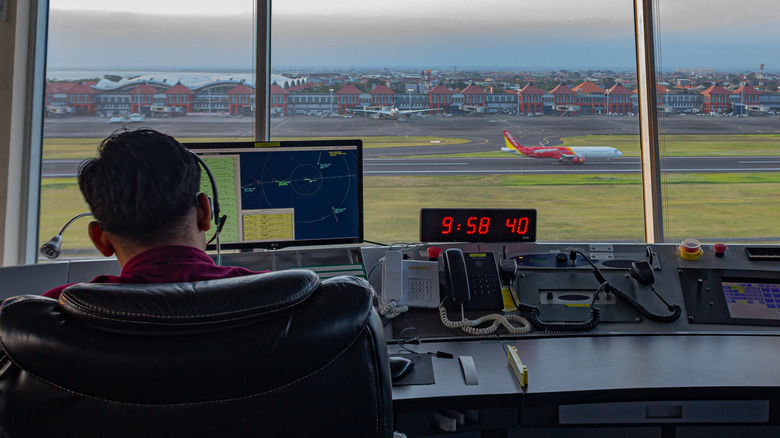What Does It Really Take To Become An Air Traffic Control Employee?
Ever wondered what it takes to guide hundreds of planes through the sky every day? Being an air traffic controller isn't just about having a cool headset and watching little blips on a radar screen — it's a demanding, stressful career that requires precision, quick thinking, and intense training. Just as there are some pretty dreadful parts of a flight attendant's job, air traffic controllers have a lot to deal with.
To even apply to become an air traffic controller, you must be a U.S. citizen under 31 years old with either one year of work experience, a bachelor's degree, or a mix of both. You also must be willing to relocate to anywhere you are needed. Then, you'll have to pass a tough entrance exam (the ATSA), a medical screening, a background check, and meet national security requirements. The application process alone can take a minimum of six months to get through.
If you make the cut, you'll head to FAA Academy in Oklahoma City, where months of intensive training will test your ability to multitask, think on your feet, and stay calm under pressure. But the learning doesn't end there — after graduation, trainees still have to practice on a simulator for eight to 10 weeks before completing an additional one to three years of on-the-job training, shadowing experienced controllers before being fully certified. It's a tough road, but for those who make it, the rewards are well worth it.
The pros and cons of being an air traffic controller
Unfortunately, there's a massive shortage of air traffic controllers, with more than 90% of facilities across the country facing understaffing, according to a data analysis by The New York Times. Aside from the job's tough qualification requirements, it's also considered one of the most stressful jobs you can have. Imagine having to navigate an emergency plane landing with hundreds of passengers relying on you for their safety.
Safely directing flights in and out of busy airspace is a heavy responsibility with zero margin for error. People in this line of work need to stay laser-focused for hours on end, make snap decisions under pressure, and multitask multiple conversations with pilots (who have a secret language), other controllers, and ground crews, all while keeping their cool.
Still, for those who thrive in fast-paced environments, it can be a really exciting and rewarding career. Air traffic controllers are paid well, with an average salary of $137,380 a year in 2023. They also get excellent benefits and early retirement at age 56. Plus, let's face it, it's also an impressive job title. The biggest challenge is getting in. The selection process is super-competitive, and only a fraction of people successfully make it through. But for anyone with a sharp mind who works well under pressure, it might just be the perfect job.

